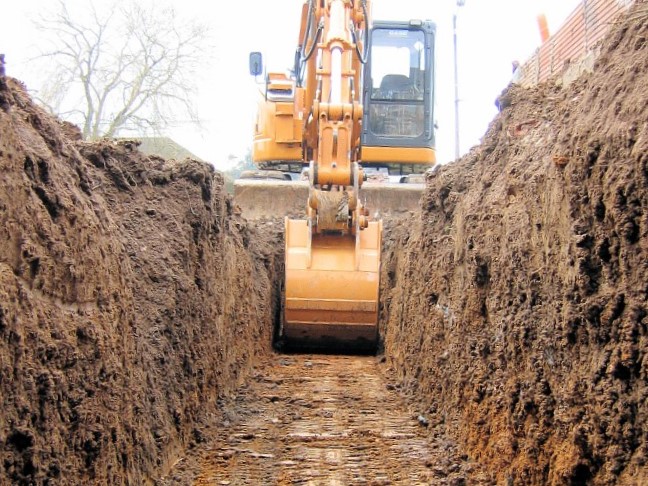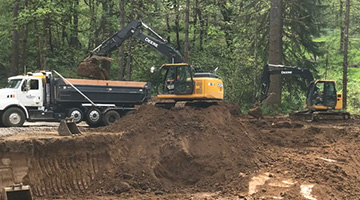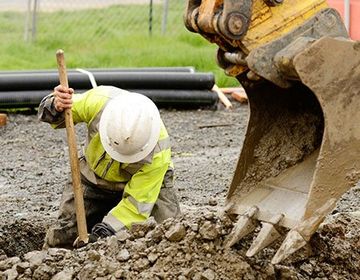Cost Effective Lancaster Excavation - High Quality Excavation at Competitive Prices
Cost Effective Lancaster Excavation - High Quality Excavation at Competitive Prices
Blog Article
Comprehensive Excavation Approaches: Grasping the Principles for Success
The cautious preparation, precise execution, and precise interest to information required in excavation projects demand a detailed method that encompasses various fundamental elements. The true mastery exists not merely in comprehending these fundamentals but in flawlessly incorporating them to navigate the intricacies of excavation projects with skill.
Recognizing Excavation Job Preparation

Successful excavation projects are developed on the structure of careful and extensive preparation. The first phase of any excavation job is the preparation stage, where important choices are made that can considerably influence the outcome of the task. During this stage, it is necessary to collect all relevant information concerning the website, consisting of topographical surveys, dirt structure, and any type of prospective threats that might exist. Recognizing the project extent, spending plan, and timeline restrictions is important for developing a thorough excavation strategy that makes certain the task's success.
One trick element of excavation task planning is the growth of a thorough timeline that outlines the sequence of deadlines, turning points, and activities. This timeline offers as a roadmap for the project team, enabling them to track development and make essential adjustments to guarantee the project remains on routine. In addition, a distinct spending plan that makes up all expenditures, consisting of tools rental, labor costs, and products, is essential for preventing price overruns and delays. By meticulously thinking about all these aspects during the planning phase, excavation tasks can be performed effectively and effectively, resulting in successful results.
Soil Evaluation and Site Examination
Carrying out detailed soil evaluation and website evaluation is an essential step in the preparation stage of any type of excavation job. Dirt analysis involves identifying the structure, framework, and buildings of the soil at the excavation website. This info is vital for comprehending the soil's bearing capacity, moisture material, and possibility for erosion, which are crucial consider establishing the excavation methods and tools needed for the job.
Site evaluation goes past soil analysis and includes a wider evaluation of the total site conditions. This assessment includes determining any kind of possible hazards, such as below ground utilities, ecological issues, or unstable terrain, that might influence the excavation process. By completely reviewing the website, job managers can create effective excavation strategies that focus on safety, effectiveness, and environmental protection.
Making use of sophisticated technologies like ground-penetrating radar, dirt tasting, and drone studies can boost the precision and efficiency of dirt evaluation and website examination. Investing time and resources in these initial actions can eventually conserve time and prevent pricey hold-ups or issues throughout the excavation process.
Devices Option and Use
Efficient excavation tasks rely greatly on calculated devices option and usage to ensure optimal efficiency and efficiency. Selecting the ideal equipment for the job is crucial in optimizing efficiency and decreasing downtime. Elements such as the sort of dirt, deepness of excavation, and project extent play a considerable duty in determining one of the most suitable devices for the job available.

Along with picking the ideal equipment, correct application is vital to job success. Operators must be educated to handle the tools safely and effectively - septic ohio. Routine maintenance checks and prompt repairs assist avoid failures and guarantee regular performance throughout the project
Safety Measures and Regulations Conformity
In the realm of excavation tasks, prioritizing safety and security steps and compliance with laws is vital to making certain a safe and lawfully sound functional environment. Precaution incorporate a variety of techniques, including performing comprehensive site assessments, implementing appropriate signs and obstacles, and providing ample safety and security training for all personnel included in the excavation process. Adherence to regulations, such as OSHA demands in the USA, guarantees that the excavation task satisfies the essential criteria to secure workers, bystanders, and the surrounding environment.

Tracking Progression and Adjusting Methods
Just how can project supervisors effectively track the development of excavation jobs and adjust their strategies as necessary to maximize outcomes? Tracking development is important for making sure that excavation tasks remain on track and meet due dates. Job supervisors can use numerous devices and strategies to track progression, such as everyday progress reports, routine website examinations, and progressed monitoring technologies like drones and GPS tracking systems. By continually keeping an eye on the task's advancement, supervisors can recognize any kind of potential hold-ups or issues early and take proactive measures to address them.

Verdict
In final thought, understanding the fundamentals of detailed excavation methods is important for the success of any job. By comprehending job preparation, evaluating dirt and site problems, selecting ideal equipment, adhering to safety and security guidelines, and monitoring progress, task supervisors can make sure a reliable and smooth excavation procedure. Carrying out these approaches will certainly bring about successful end results and lessen prospective threats or problems during the excavation project.
The initial phase of any kind of excavation task is the planning stage, where important choices are made that can substantially influence the result of the job. Understanding the task extent, budget, and timeline constraints is crucial for producing an extensive excavation plan that guarantees the job's success.
How can predict supervisors efficiently track the innovation of excavation projects and adjust their methods accordingly to enhance outcomes? By very closely keeping track of progression and being eager to adjust discover here techniques, job supervisors can improve the general success of excavation projects.
By comprehending task planning, evaluating soil and website conditions, choosing appropriate equipment, complying with safety laws, and keeping track of progression, project managers can guarantee a efficient and smooth excavation process.
Report this page